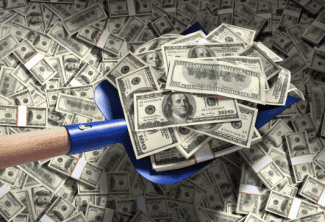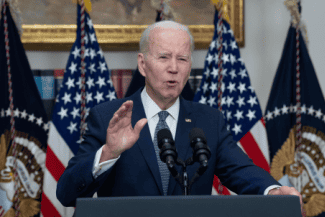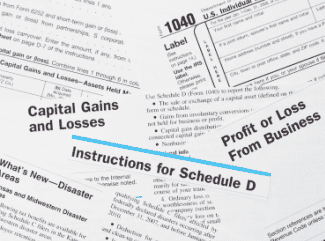Double-Digit Mortgage Rates on Horizon?
by Steve Bergsman
 listings. I would say we chatted, but Williams is a born raconteur and I mostly just listened.
listings. I would say we chatted, but Williams is a born raconteur and I mostly just listened.
After a while, a young man from New York joined us and in the course of the shifting conversation, the Big Apple dude wistfully noted he was renting an apartment but considering buying a condo. Williams turned his attention to the young fellow. “Now is the time to buy,” he exclaimed.
The reason for Williams’ emphasis on buying now? Was it because housing prices had gotten so low that good deals were everywhere? Actually, no. Williams strongly suggested to the New Yorker he should make his investment sometime this year as expectations are that interest rates were bound to rise and wouldn’t stop climbing until they hit double digits. That would make any future purchase considerably more expensive than it would today.
I, too, expect interest rates to start heading north again, but double digits seemed far out there — not in terms of a time line, but psychologically.
Williams rationalized that at some point in the near future, the economy was going to elevate very dramatically, which would raise the specter of inflation. If that happened, the Federal Reserve would push up interest rates to keep inflation under control.
I didn’t disagree with that scenario. However, I don’t believe the economy, when it does turn around, will take off like a rocket, so the government’s need to contain a budding inflationary climate would be moderate at best.
There are other factors to consider as well.
Interest rates have been kept low since the short recession at the turn of this century, and this was one of the causes of the housing bubble that lasted until 2007. Once the economy stabilizes, I figure the Fed might want to raise interest rates, thus slowly bringing them back to more sustainable levels, something like 3-4 percent.
Then there is the massive pumping of stimulus dollars into the economy.
Globally, the first major nation to experience economic recovery has been Australia, and there is already speculation interest rates will start to rise there. Now, tell me if this doesn’t sound familiar: as the Wall Street Journal reported, Australia’s recovery comes at a time “when huge amounts of government stimulus are still coursing through the Australian economy, raising fears of higher inflation in the years ahead if the central bank doesn’t start raising rates fairly soon.”
All those stimulus dollars have to come from somewhere. Sure, we could just print more money, but that would be hyperinflationary, so the federal government, instead, borrows it, which is less inflationary.
There are concerns about the budget deficit, which “looks like it is going to be huge,” notes Celia Chen, a senior director at Moody’s Economy.com. “If the budget deficit is too large, then the government is borrowing a lot and having to issue more Treasury bonds. That will cause the price of Treasuries to fall and if that happens, yields have to increase and interest rates will rise.”
No matter, how one slices and dices the economic prestidigitations, pressure continues to build on the government to raise interest rates, probably next year.
“There is no doubt that interest rates are going to have to go up,” says William Conerly, an economic consultant and author of “Businomics From the Headlines To Your Bottom Line: How To Profit in Any Economic Cycle.”
At some point the Federal Reserve is going to have to worry about inflation, Conerly adds. “Certainly not in 2009, but in 2010 the Fed will probably start pushing up short-term interest rates. If the economy gains some steam in the second half of this year, the long-term markets will push rates up even before the Fed tightens, so we’ll see Treasury yields rise even further between now and spring 2010.”
As of the third quarter, the spread between mortgages and the 10-year Treasury was wider than normal, which will narrow, but that won’t be enough to prevent the cost of borrowing from getting more expensive. Does that mean Richard Williams was on target in soothsaying interest rates and subsequently mortgage rates will be heading into the double-digit range, thus making home purchases considerably more expensive?
In summer 2009, mortgage rates had risen from below 5 percent earlier in the year to about 5.2 percent, and Conerly’s predictions are that the 30-year fixed mortgage rate will climb to 7.7 percent at the end of 2010.
Chen’s crystal ball shows a more conservative picture. “We have the fixed-rate climbing to 6.6 percent in 2010,” she says. “We expect mortgage rates to rise to 6.9 percent in mid-2011 and we don’t have those numbers going above 7 percent until the year 2012.”
Chen expects a reasonable economic rebound but inflation remaining at bay. Still, she recognizes there are some risks ahead. “Those predicting a higher mortgage rate are worried about too much credit on the market and the Fed having to keep inflation from creeping back,” she adds.
I bought my first home back in the 1970s. Apparently, sometime around then so did Conerly, because we both remember having to acquire homes at double-digit interest rates. Indeed, it wasn’t until 1985 that interest rates fell below double digits. The concern about interest rates rising past what to some is the seemingly astronomical 6 percent mark brings considerable levity to Conerly’s demeanor.
“I hear real estate brokers whining that interest rates, which have been at record lows, may go up to 6.5 percent,” he says. What these brokers don’t realize, he adds, “is that they are really living in the golden age of mortgage rates.”
Steve Bergsman is a freelance writer in Arizona and author of several books, including “After the Fall: Opportunities and Strategies for Real Estate Investing in the Coming Decade.”
Copyright 2009 Inman News















 Accessibility
Accessibility